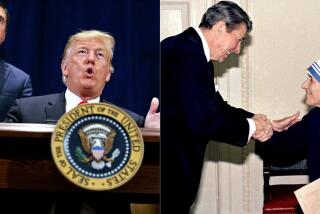How Best to Serve?
- Share via
When, in the course of human events . . . .
Last year President Reagan chose the words of the Constitution to keynote his inaugural. This year Reagan draws on the Declaration of Independence to promote his beliefs and programs. Reagan always has spoken of the Founding Fathers and the American Revolution with simplistic reverence. He imparts to them a religious and patriotic unity and devotion that is somehow supposed to be akin to Reagan’s own revolution against big government. But the parallel is a tenuous one. The founders clashed on many political and philosophical issues, even on the question of whether to separate from Britain and to unify the colonies into a new nation. In the fall of 1775 George Washington lamented the “dearth of public spirit” toward the cause.
We hold these truths to be self-evident . . . .
The Declaration itself did not create an instant nation through the stating of newly discovered truths. There already was a New World political tradition. By July 4, 1776, the colonies had been at war with Britain for more than a year. Rather than a national charter, the Declaration was a political document attempting to define and justify the rebellion in the strongest moral terms and to secure foreign assistance, particularly from France. That its truths were not self-evident to all was demonstrated by the necessity to fight a long revolutionary war, and a costly and bloody civil war 90 years later.
That all men are created equal . . . .
The President attempts to equate the ideals of the Declaration to his own political goals. But the words and phrases may not mean the same thing in 1986 as they did in 1776. The Founders clearly did not believe that all persons were equal in talent, physique, disposition or even in legal status--the question of slavery, for instance.
They debated equality in the abstract context of human nature, civic virtue and public duty--words that rarely arise in modern politics. For 200 years historians have disagreed on whether the Revolution was motivated primarily by liberal, materialistic self-interest or the ancient republican concept of civic virtue. Even after the framers adoptedthe Constitution, they were not at all certain that the American people would succeed in governing themselves.
Prudence, indeed, will dictate that governments long established shall not be changed for light and transient causes . . . .
Put simply, Reagan has preached that less government is good and more government is bad. He incorrectly equates less government with conservatism. Edmund Burke, the pre-eminent 18th-Century conservative philosopher, avidly believed that government can be an ennobling force for good if it has the proper leadership and discipline. Burke, seeming to anticipate supply-side economics and Gramm-Rudman budgeting, wrote that “the state ought not to be considered as nothing better than a partnership agreement in a trade of pepper and coffee, calico, or tobacco, or some such low concern.”
. . . Our lives, our fortunes and our sacred honor.
The nation has been awash in patriotic nostalgia since the Bicentennial a decade ago. There will be more with the bicentennial of the Constitutional Convention next year. It creates a warm feeling, but does little to prepare the nation for the intellectual choices that need to be made about the sort of political future that we want.
Nostalgia about the Declaration is fruitful if it inspires Americans to explore their political roots and to use that knowledge to work toward the construction of a better society centered on common interests, needs and goals. The answer to the future cannot be found in misconceptions about what the Founders meant in the Declaration or the Constitution. What can be of benefit is the example of the intellectual vigor with which the Founders examined the mysteries of politics and government.
The eschewing of political labels and the weakening of the parties has made the political terrain murky and confused except for instant issues gratification. The terms, including the concept of leadership, need to be defined anew so that Americans can attempt to determine not just where they are going, but how. The bicentennial of the Constitution is an appropriate time to do so.
Reagan is not the only politician to apply a glossy, superficial interpretation to the founding and meaning of the American Republic. But, as President, he sets the limits and tone of the debate and seems to be particularly intent this year on reordering the federal establishment to fit his own mental conception of 1776.
The deficit dilemma gives the President an excuse for his actions. As important as the deficit issue may be, there is a fundamental question that needs to be asked: Will this best serve the nation and its future? Perhaps even more basic is this question: Are we morally and intellectually equipped to know?
More to Read
Get the L.A. Times Politics newsletter
Deeply reported insights into legislation, politics and policy from Sacramento, Washington and beyond. In your inbox twice per week.
You may occasionally receive promotional content from the Los Angeles Times.










